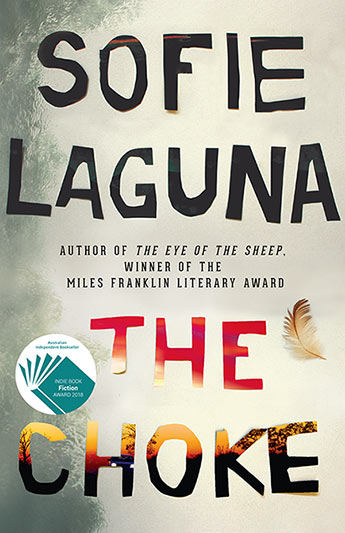 Reviewed by Magdalena Ball
Reviewed by Magdalena Ball
The Choke
By Sofie Laguna
Allen & Unwin
ISBN: 9781760297244, Sept 2017, 384 pages, Paperback
When I finished reading Sofie Laguna’s latest novel, The Choke, I put my head down and quietly sobbed. This is not because the book was sad or depressing, though it certainly gets dark at times. It was more a visceral reaction to the combination of harrowing ugliness of its protagonist’s world against the absolute beauty of her perspective. There’s an almost victorious, redemptive quality to the story of Justine Lee, a ten year old girl who is raised primarily by her grandfather “Pop”, a PTSD addled World War II veteran who was a Japanese Prisoner of War. The story is set in the early 1970s along a section of the Murray river, which appears to be based on the Barmah Choke, referred to in the book The Choke o– where the banks of the river narrow. Much of the story happens at The Choke, which sometimes functions as a meeting place, and not just for the river banks:
Down at The Choke the river pushed its way between the banks. The water knew the way it wanted to go. Past our hideouts, past our ring of stones, past the red gums leaning close enough to touch—it flowed forward all the way to the sea. (11)
The word “choke” has multiple meanings and also refers to the insular, restrictive ‘choking’ nature of Justine’s life – and the way in which enthusiasm is choked out – via school, home, the relationship between people – particularly men and women, though institutions as a whole also form part of that constriction. The land—beautiful at times, desolate and ominous at other times–provides a rich backdrop to Justine’s coming-of-age story. Laguna has particular skill in capturing the voice of abused children, honed in both of her previous novels The Eye of the Sheep and One Foot Wrong, and she pulls the reader directly into the perceptions and perspective of Justine, creating a deep empathy and identification. This is done through a mastery of showing rather than telling – we see and perceive Justine’s world as Justine does – in limited openings and closures; in bursts of pain and wonder; and with an innocence that isn’t dulled by the abuse she witnesses and suffers at the hands of the men that surround and control her world. Justine doesn’t know that she has dyslexia. She thinks she’s just backwards and trouble, as evidenced by her own breech birth and her mother’s departure shortly afterwards, nor does she perceive the dysfunction in her family as anything other than inevitable and natural. The adults in Justine’s life systematically fail her: her father, her teachers, her grandfather, her missing mother, the neighbours who are feuding with her family, and even her older half-brothers, but Justine’s longings and emotional growth, the tender relationship she forms with Michael, a disabled student at her school, and her relationship with her aunt are point of light that keep the story transcendent, even at its darkest points. Justine’s transformation is all the more powerful for the subtle way in which Laguna handles it through Justine’s increasing command of language as she moves from ten to fourteen.
As has become something of a trademark for Laguna, Justine’s voice forms the narrative backdrop for the book. It’s an extraordinary combination of naïve, descriptive, and poetically dense, driving the reader through a story often harrowing and dark, but always with a sense of discovery. The natural environment of “Pop’s Three” – the land they live on, Justine’s dangerous father and brothers, her experiences at the school or feuding with the neighbours, are all filtered through Justine’s perspective. The vernacular of Justine’s voice is always tempered by clarity – so the reader is never lost, and always engaged in the moment, making The Choke a very fast and intense read:
They tore at the branches of my hideout. They pulled away my bark-and-leaf walls, my towel-and branch roof, my chimney of twigs. I threw rocks and dirt at them, then I ran to Kirk’ hideout and kicked at the top of the log. The log fell away, breaking into pieces. Kirk threw me on the ground and sat on me. I kicked and bucked, pushing up and down, twisting my head from side to side so that I saw the sky in pieces, dirt to sky dirt to sky dirt to sky.” (4)
Throughout the book, the spectre of male violence underpins everything and even overshadows the poverty that Justine lives in. Aside from Michael, whose care and intelligence becomes a world of possibilities for Justine, most of the males in the book are on the verge of exploding and several of them do, causing terrible damage. Guns, knives, and fists are all in heavy use, and the testosterone-laden anger and pain provide a contrast to Justine’s innocence, her growing hunger for connection, and the joy she finds in everyday life, from feeding her grandfather’s chickens, to her a growing sense of self-awareness, transformation and empowerment. The result is a book that is both gritty and utterly exquisite. The Choke is another extraordinary novel from a writer who is never afraid to go deep into the darkest recesses of human depravity and find something beautiful.